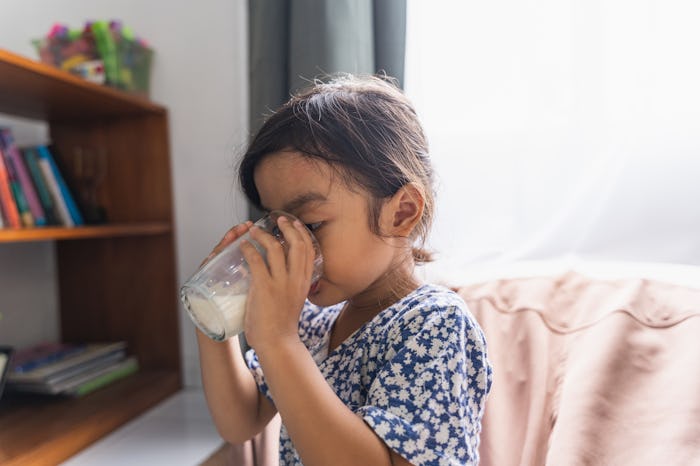Put Down The Powder

Kids Really Don’t Need That Much Protein, So Save Your Money On Shakes
Plus, adult shakes and powders might do kids more harm than good.
In a world where we’re all trying to up our protein intake, and struggling to eat a gram per pound of your ideal body weight per day (where did that recommendation even come from?), it’s natural to wonder if you need to be intentional about your kids’ protein consumption, too. This is especially true for parents with picky eaters who wonder how their kid is surviving on graham crackers and gummies alone. So, can kids drink protein shakes if you think they need a little boost of the nutrient? A pediatric dietitian explains which protein shakes are safe for kids, which ones aren’t, and why you probably don’t need to waste your money on either.
Can kids drink protein shakes?
If they’re specifically labeled as pediatric protein shakes, formulated for kids, et cetera, then sure. “It’s generally safe to give kids protein shakes as long as they’re made for kids. So as long as it says something on the box ‘kids’ shake,’ or ‘pediatric shake,’ those are made for kids,” says Lindsey Donovan, MS, RDN, a pediatric clinical dietitian at Wolfson Children’s Hospital of Jacksonville.
Protein shakes and powders marketed toward adults, on the other hand, could do more harm than good for little bodies. “If kids are getting too much protein, that can be a shock to their kidneys. Other than them having too much protein since they’re made for adults, they're going to have recommended vitamins and minerals for adults, which are going to be a lot more and can lead to vitamin and mineral toxicities in kids if they're having too much.”
So, if you’ve ever been tempted to sprinkle some of your protein powder into your kid’s smoothie, put it back in the pantry. Even if you find safe shakes, chances are your child doesn’t need you to supplement their protein intake. “In general, we are worrying too much about it, at least for kids. They really don’t require that much protein,” Donovan says.
How much protein do kids actually need?
Protein is the macronutrient on everyone’s mind these days, so naturally you’re going to wonder about whether or not your child is getting enough of it (since the amounts recommended on social media for adults often feel impossible to eat). But kids, it turns out, really don’t require much protein at all.
Here’s how much protein your kid actually needs, according to the U.S. Department of Health and Human Services, and cited by Donovan:
- Ages 1 to 3 years: 13 grams per day
- Ages 4 to 8 years: 19 grams per day
- Ages 9 to 13 years: 34 grams per day
- Girls ages 14 to 18 years: 46 grams per day
- Boys ages 14 to 18 years: 52 grams per day
These numbers can differ if your child has certain health conditions, Donovan explains. For example, children with cancer may need to increase their protein intake, while kids with kidney disease might need to lower it. Protein shakes can also come in handy if your child has a really limited diet and eats mainly carbohydrates. In all of these cases, parents should work closely with their pediatrician or dietitian to make sure their child’s diet is helping them stay healthy.
What are the most protein-rich foods for kids?
If you’re not sure how much protein is in the foods your kid likes (say, a scrambled egg), you’re probably left wondering about whether they’re getting enough.
“If they’re drinking milk, a half a cup of milk contains 4 grams of protein in it, and that’s a complete protein that your body can use up,” Donovan says. “One egg is 6 grams of protein. One tablespoon of any nut butter is going to be 3 grams of protein.”
You can also serve beans and other plant-based proteins, though Donovan cautions that these are incomplete proteins, which just means our body needs us to eat some amino acids alongside them in order to really use them. “For beans, I recommend pairing them with rice, which has its own amount of protein in it. A half a cup is usually around 3 or 4 grams of protein, too.”
So, between breakfast, lunch, and dinner, your kid is likely getting all the protein they need in a day from their diet. But if you feel like your child might need a little extra, talk to their doctor about it and only offer them kid-safe protein shakes.
Expert:
Lindsey Donovan, MS, RDN, a pediatric clinical dietitian at Wolfson Children’s Hospital of Jacksonville